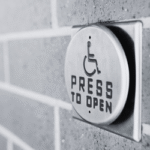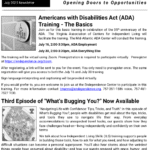
Medicaid Waiver Information Center
Partnership of Private and Public Organizations
The Medicaid Waiver Information Center provides information, materials, workshops, and advocacy meetings about Virginia Medicaid Home and Community-Based Waiver Services. The Waiver Information Center strives to present information that is understandable and practical.
The Waiver Information Center was established by 45 community organizations throughout Virginia. The Waiver Information Center is administered by the Endependence Center in Norfolk and was established with a Virginia Board for People with Disabilities grant in 2000. The community organizations provide support for advocates from their organizations to conduct workshops and provide information to the general public.
Mentors are people in your community who represent disability organizations throughout Virginia. The Medicaid Waiver Mentors are supported by their organization to receive training on Medicaid, to conduct workshops, and to provide information about Medicaid Waivers to people in their community. Contact information is in the VA Medical Waiver Services Guide on page 37.
Contact the Waiver Information Center
Contact the Waiver Information Center for more information about the following:
- Workshops can be held in your community to share information about Virginia Medicaid Waivers. Contact the Center to schedule a workshop or for information about scheduled workshops.
- Individual assistance and information about Virginia Medicaid Waivers are available from the Mentors and the Waiver Information Center.
- Materials such as this Guide, workshop handouts, and other documents are available.
- Virginia Medicaid Waiver Network advocates for the improvement of Virginia Medicaid Waiver services. The Network was established by the Mentors and includes various disability organizations and individuals working together. Meetings are several times a year.
Posts
Your Rights
Procedural safeguards protect your rights in the Medicaid system. This document will provide you with some basic information about your rights regarding appeals, choice, confidentiality, consent, enrollment, financial eligibility, human rights, planning, providers, records, screening, waiting lists, and written notice. Word Format Rights Document PDF Format Rights Document
Virginia Department of Medical Assistance Services
For the Virginia Department of Medical Assistance Services, a Virginia Medicaid agency, you can contact them at 804-786-7933 or at www.dmas.virginia.gov
Virginia Department of Medical Assistance Services
For the Virginia Department of Medical Assistance Services, a Virginia Medicaid agency, you can contact them at 804-786-7933 or at www.dmas.virginia.gov
Medicaid Waivers
Medicaid Waivers were developed to encourage people with disabilities and the elderly to access services in their homes and communities. Medicaid is a joint federal-state program. Medicaid Waivers provide funding to serve people who are eligible for long-term care in institutions such as hospitals, nursing facilities, and intermediate-care facilities. Through Medicaid Waivers, states can “waive” certain requirements including the requirement that individuals live in institutions in order to receive Medicaid funding.
Community Service Boards and Behavioral Health Authorities
For the CSB or BHA in your locality, call toll-free 1-800-451-5544 or go to www.dmhmrsas.virginia.gov (click on “Locate Services in Virginia” in the left-hand bar, then click on “Community Services Boards”).
Social Services Departments
For the Social Services Department in your locality, call toll-free 1-800-552-3431 or go to www.dss.virginia.gov (click on “Local Offices”).
What MORE Can You Do?
In order to get the necessary services for your child, caregivers need to be advocates. Waiver slots are limited in number and cannot serve all the people who could benefit from waiver-funded services. If you feel your family member truly needs a waiver slot and is eligible for one, you must take action.
If a waiver slot is denied:
- Double-check the eligibility criteria, including those for any waiting lists on the waiver in question. For the MR/ID and Day Support Waivers, persons on the Urgent and Non-Urgent Waiting Lists have higher priority than those on the Planning Lists.
- Talk with your case manager’s supervisor for a second opinion on the denial.
Request “reconsideration.” The agency then has 10 days to reconsider the application and either approve it or present additional reasoning for upholding the denial. If the agency fails to reconsider within 10 days or if the denial is upheld, you can appeal the decision.
Medicaid in Other States
Consider the alternatives when making a decision to move to another state.
Medicaid waivers vary from state to state. If an individual receives waiver services in Virginia and then moves to another state, he or she will lose the Virginia waiver funding. The person must reapply for waiver services in their new home state. (Exceptions to this policy are made only in the case of individuals placed out of state by the Virginia services network). It is important to consider the alternatives when making a decision to move to another state. Your case manager can give you information to assist you with this decision.






